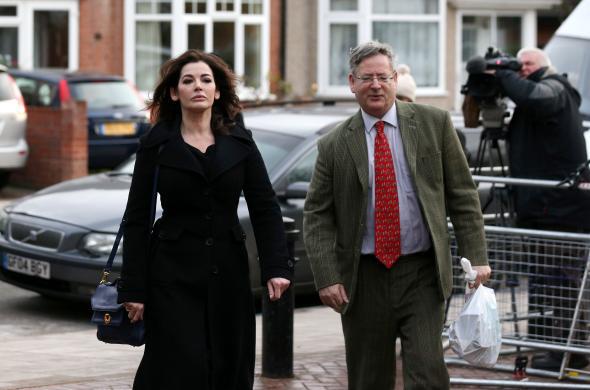For the past few weeks, British tabloids have tirelessly covered the trial of two assistants accused of embezzling money from their bosses. On the surface, this topic doesn’t necessarily seem worthy of a media circus—unscrupulous workers steal from their employers every day. What makes this trial different is that the assistants worked for Nigella Lawson, the cookbook author and television personality, and Charles Saatchi, Lawson’s ex-husband, who was photographed choking Lawson earlier this year. (The couple divorced shortly after the photographs were made public.)
The story is undoubtedly salacious (albeit complicated). The assistants, Italian sisters named Elisabetta and Francesca Grillo, are accused of putting 685,000 pounds on Saatchi’s credit cards for personal expenses. They have claimed that Lawson approved those purchases in exchange for their silence about her alleged cocaine and pill addiction. Their allegations sound like details from a tawdry thriller: The Grillos say Lawson gave drugs to her two children and that she stored a stash of cocaine in a secret hollowed-out book. Lawson, for her part, claims that Saatchi is behind the rumors of Lawson’s drug addiction and that he wants to discredit her in order to burnish his own reputation after the choking incident.
The press frenzy reached its apotheosis this week, when Lawson herself took the stand to respond to the drug allegations—she says she’s used coke and marijuana a handful of times in her life but isn’t an addict—and to answer questions about her finances and her marriage to Saatchi.
Regardless of which allegations are true—I, for one, am inclined to believe Lawson, especially given how sleazy Saatchi has appeared in prior statements to the press—it’s surely an unpleasant moment for a woman who has always had a dysfunctional relationship with the press. Lawson rose to prominence in the U.K. and the U.S. around the turn of the 21st century with two best-selling cookbooks, How to Eat and How to Be a Domestic Goddess, and a slickly produced cooking show called Nigella Bites. Lawson is a smart, funny, memorable writer—I’ve practically memorized a line she wrote about muesli and trot it out in conversations every few months or so—and on television, she came across as articulate and charmingly self-deprecating.
But if you just read articles about Lawson, you wouldn’t know anything about her writing talents; you’d just think she was a flirtatious sexpot. Critics seemed unable to refrain from focusing on her conventionally beautiful face and her curvaceous body—two traits she was born with—instead of her talents and personality. The press began calling her “the domestic goddess,” even though the title of her baking book was clearly tongue-in-cheek, and they began cooking up overblown conflicts between Lawson and feminists. (Lawson has said quite clearly that she is a feminist.)
The same dynamic has been in play as Lawson has taken the stand at the Grillos’ trial. Tabloids like the Daily Mail have scrutinized Lawson’s face, hair, makeup, and clothing in court—as the Guardian‘s Jane Martinson puts it, “Nigella Lawson endures trial by media, and her appearance is exhibit A.” Meanwhile, on the stand, Lawson has been as articulate, funny, and insightful as one can be when one is being interrogated about one’s abusive marriage and drug use. Lawson has cannily analyzed the way the media have framed her situation as a fall from grace. (“I felt that this would not become a fraud case,” she said on Wednesday. “I would be put on trial, and actually that’s what has happened.”) Her descriptions of her drug use have been eloquent and sympathetic: “I felt subjugated to intimate terrorism by Mr. Saatchi,” she said by way of explaining having taken cocaine in 2010, later adding that pot “made an intolerable situation tolerable.” She’s pushed back against sexist questions, saying, “I don’t think it is the job of a woman to run a house.” And she’s even managed to get in a self-deprecating (if not precisely accurate) line when asked if she uses cocaine daily: “People who do that are a lot thinner than I am.” Her wit and intelligence, always the key features of her writing, have been on full display.
But don’t expect her critics and legal adversaries to notice—as far as they’re concerned, she’s just an aging coquette. Yesterday, the Grillos’ lawyer made a point to get in that long-misapprehended epithet, suggesting Lawson doesn’t do her own grocery shopping and then adding, “This is no criticism of you as a domestic goddess.”
But don’t expect her critics and legal adversaries to notice—as far as they’re concerned, she’s just an aging coquette. Yesterday, the Grillos’ lawyer made a point to get in that long-misapprehended epithet, suggesting Lawson doesn’t do her own grocery shopping and then adding, “This is no criticism of you as a domestic goddess.”
